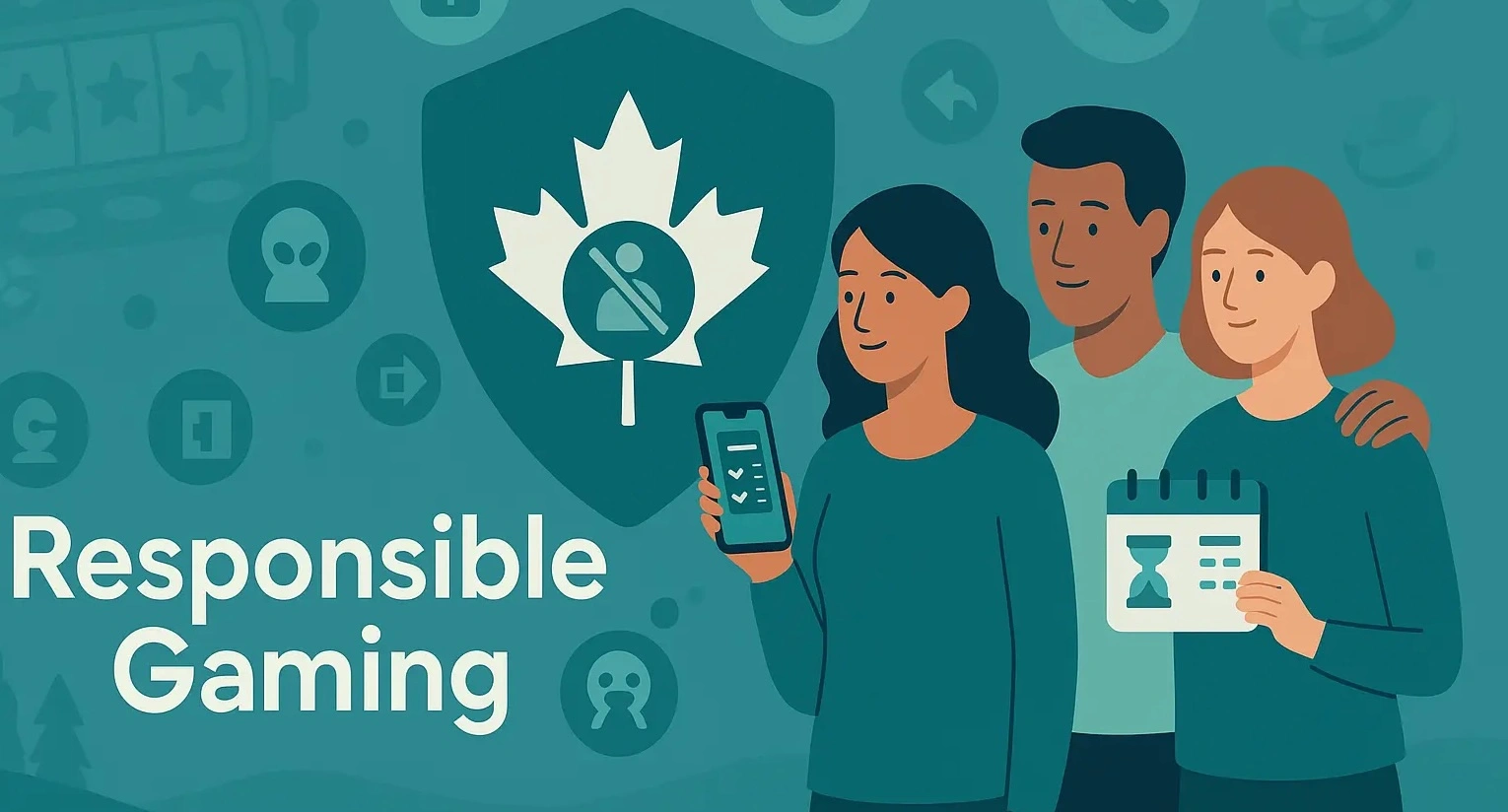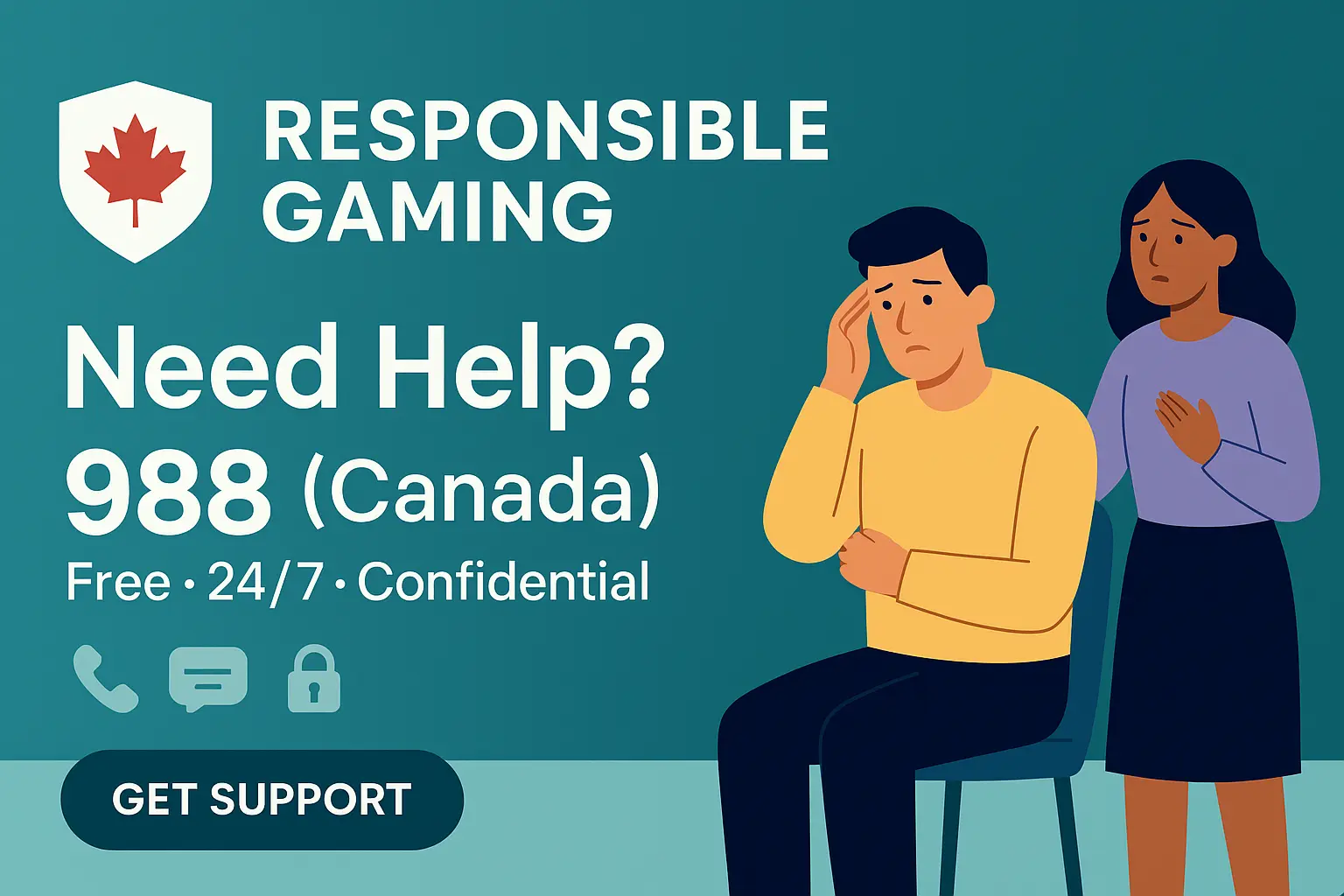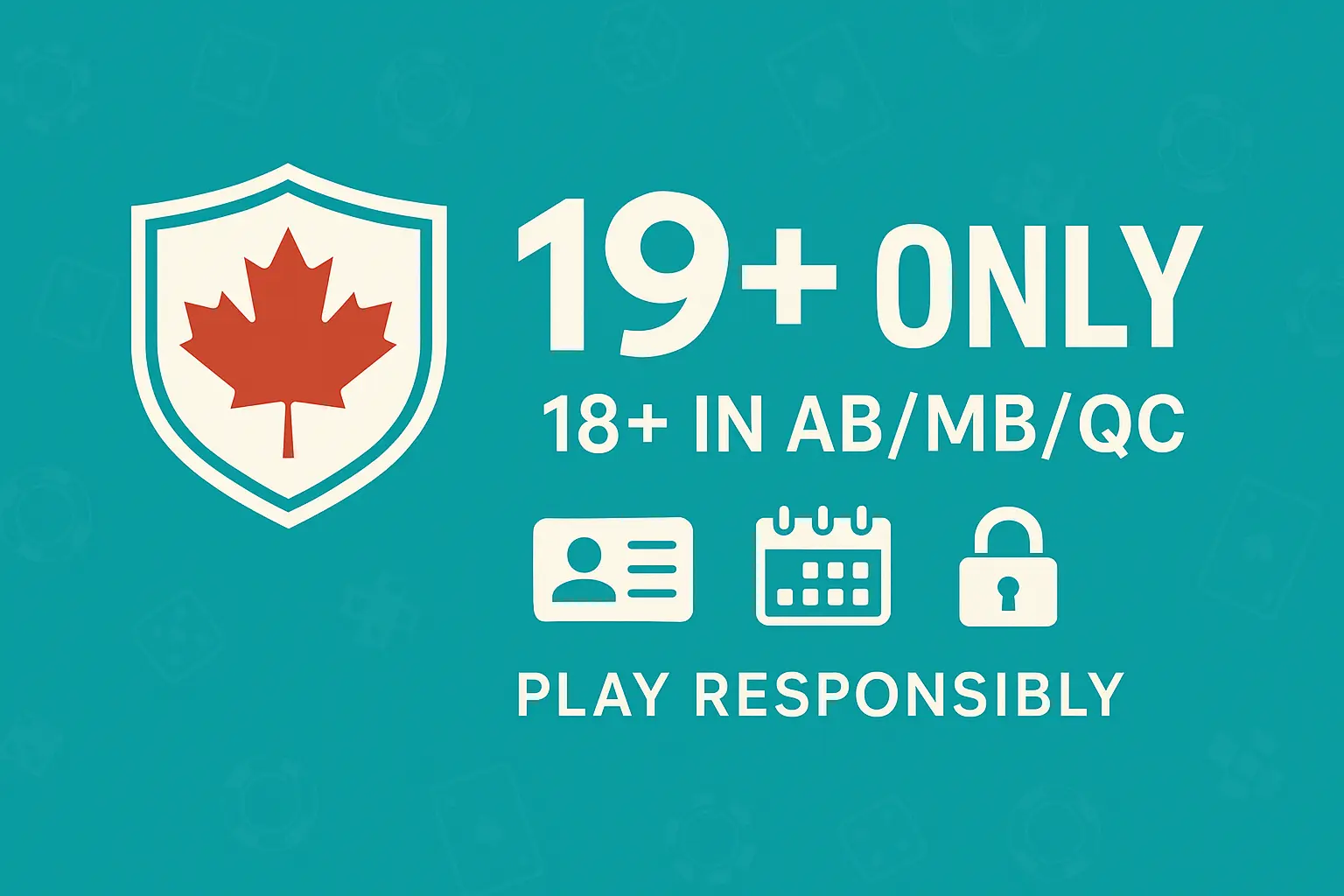🎯 Responsible Gaming in Canada (18+/19+)
Gambling should be exciting, social, and firmly under your control. This page explains what responsible gaming means, how to spot the early warning signs of gambling harm, and exactly what to do if you’re worried about yourself or someone you love. You’ll also find helplines and practical tools—so you can play smart or take a break when needed.
🔞 Age notice: This website is intended for adults. The legal age to gamble is 19+ in most provinces/territories, and 18+ in Alberta, Manitoba, and Québec. Always follow your local laws.
🚨 Need help now?
If gambling is causing stress, debt, or conflict—or you’re worried about a friend or family member—talk to someone today. The services below are free, confidential, and many are available 24/7.
Here’s how to reach the right helpline quickly:
- Ontario: ConnexOntario – information, live support, and referrals to local treatment.
- British Columbia: Gambling Support BC – counselling and support for individuals and families.
- Alberta: AHS Addiction Helpline – province-wide counselling and referrals.
- Québec: “Jeu : Aide et Référence” – specialized gambling support and guidance.
- Manitoba: Provincial addictions helpline – assessment and treatment navigation.
- Saskatchewan, Atlantic provinces, Territories: Provincial/territorial mental health & addictions helplines can connect you to gambling-specific services in your area.
- In crisis? Canada’s Suicide Crisis Helpline is 988 (free, 24/7).
💡 What responsible gaming looks like
Responsible gaming means putting clear limits around your time and money, keeping gambling entertainment-focused, and using built-in tools (like deposit limits and time-outs) to stay in control.
To keep play low-risk, start with these baseline habits:
- Set a firm monthly gambling budget you can comfortably afford, and treat it like movie or hobby spend—not bill money.
- Decide how many days per month you’ll gamble and schedule “no-play” days in your calendar.
- Pick one or two game types you enjoy and avoid constant switching, which can nudge overspending.
- Never gamble under stress, fatigue, or the influence—decisions are harder and chasing is more likely.
🔎 How to recognize a gambling problem
Gambling harm doesn’t show up overnight. It often builds quietly. Catching patterns early makes change much easier.
Watch for these common warning signs:
- Money stress appears (borrowing, using credit, selling belongings, or missing payments).
- Time keeps slipping (playing longer than planned, losing track of hours, canceling plans to gamble).
- Chasing losses becomes a pattern (trying to win back what was lost, raising bet sizes after losses).
- Secrecy increases (hiding statements, deleting apps/notifications, lying about time or spend).
- Mood changes intensify (irritability, anxiety, guilt, or sleeplessness connected to gambling).
- Cut-back attempts fail (repeated promises to stop “after one more win,” but it doesn’t stick).
If you’re unsure where you stand, ask yourself these quick questions:
- “Have I spent more than I meant to in the last month?”
- “Have I tried to hide my gambling from someone close to me?”
- “Have I chased losses or played while upset?”
- “Have I needed higher stakes to feel the same excitement?”
A “yes” to any of the above is a strong nudge to take action now.
🛑 What to do if you’re worried (step-by-step)
Taking action today can prevent bigger problems tomorrow. You don’t have to do everything at once—one small step counts.
Begin with these immediate moves:
- Tell one person you trust what’s going on and ask for accountability.
- Contact your provincial helpline for a no-pressure chat and a list of local supports.
- Set fresh limits (money and time) before your next session—or decide to pause completely.
Then add structured guardrails:
- Create deposit, loss, and session limits on every gambling account you use. Set these when you’re calm, not mid-session.
- Use reality checks and time-outs to build natural breaks into play and reduce “auto-pilot” decisions.
- Enable strong multifactor authentication and remove saved payment methods to slow down impulsive deposits.
If limits aren’t enough, choose a formal break:
- Self-exclusion programs (online and land-based) let you take a break for a set period, with access blocked during that time.
- Ask support staff to help you enroll if forms feel overwhelming—helplines and live chats can walk you through it.
- Mark your calendar with your return date and plan sober, non-gambling activities for the first weeks of your break.
🧰 Tools inside your gambling accounts
Most licensed casinos offer robust safer-play features you can turn on in minutes.
Turn on these tools before your next session:
- Deposit and loss limits to cap how much you can add or lose in a set period.
- Time-based reminders (“reality checks”) to prompt breaks and review spend.
- Cool-offs or time-outs for short, commitment-free breaks (hours to days).
- Self-exclusion for longer breaks (months to years) across online and, in many provinces, retail venues.
- Account history dashboards so you can see deposits, withdrawals, and session length at a glance.
🔒 Blocking access across your devices
If willpower isn’t enough, technology can do the heavy lifting.
Consider these device-level protections:
- Dedicated blocking apps that restrict access to gambling websites and apps across phones, tablets, and computers.
- Router-level blocks at home to prevent gambling domains on your Wi-Fi for every device in the house.
- Bank merchant-category blocks (if available) to decline gambling transactions automatically.
- Notification detox by unsubscribing from promo emails and turning off push prompts that trigger urges.
🧠 Why gambling can feel “sticky” (and why that’s not your fault)
Modern gambling mixes fast play cycles, near-misses, and unpredictable rewards—a recipe that strongly activates the brain’s reward system. After losses, your mind may fixate on “getting even,” and after wins, it may crave repeating the feeling. That’s a human response, not a personal failing.
Here are healthy ways to interrupt the cycle:
- Name the urge (“I’m having an urge to chase”) and wait ten minutes before any decision.
- Swap the stimulus with a short walk, shower, or call to a friend—motion helps reset thoughts.
- Track feelings and spend in a simple note app; seeing patterns on paper makes change easier.
- Schedule alternatives (gym, gaming, cooking, movies, time with friends) during your usual gambling windows.
📉 Lower-risk play rules you can live by
Simple, visible rules reduce the chance of harm and keep the fun intact.
Adopt these guardrails and pin them to your notes app:
- Keep gambling spend small relative to your monthly household income, and never use rent, bills, or essentials.
- Limit gambling to a few days per month and block out “no-play” days in your calendar.
- Stick to one or two game types that you enjoy; constant switching increases risk.
- Set a win and loss limit before you start (e.g., stop after doubling your session budget or after losing it).
- Leave payment methods off-file so depositing requires an extra, deliberate step.
- Quit when you’re tired, stressed, or celebrating—both lows and highs can cloud judgment.
❤️ For family members and friends
Watching someone struggle is tough. Your support matters—and you also deserve support for yourself.
Use this gentle, practical approach:
- Pick a calm time and share observations, not accusations (“I’ve noticed you’re more stressed and money’s tight; I’m worried about you”).
- Offer options, not ultimatums by sharing helplines and asking if they’d like you to sit with them during the call.
- Protect essentials by separating rent, bills, and groceries from shared accounts and agreeing on spending limits.
- Avoid paying off gambling debts—it can accidentally enable more gambling.
- Find your own support through family-focused services or peer groups; caring for yourself helps you care for them.
🌐 International organizations
Some readers prefer global resources or may split time between countries. These organizations provide excellent information and, in some regions, live support.
Consider bookmarking these well-known names:
- GamCare – education, live chat, and practical self-help tools (primarily for Great Britain).
- GambleAware – advice, self-help resources, and signposting within the National Gambling Support Network (GB).
- Gambling Therapy – online support and forums with a global audience.
✅ Our commitment to safer play
We believe great gaming starts with clarity and control. On our site, we clearly label legal-age requirements, avoid glamorizing risky behaviour, and encourage the use of limits, cool-offs, self-exclusion, and helplines whenever play stops being fun. If you think any page could better support responsible gaming, tell us—we’ll improve it.
🔞 Final reminder: If you’re worried about gambling—your own or someone else’s—reach out today. One conversation, one limit, one day at a time can change everything.
Charisse is a content contributor for Kika Casino. With a passion for audience experience and a focus on reliability, Charisse delivers fact-checked articles covering industry news and gaming tips.



